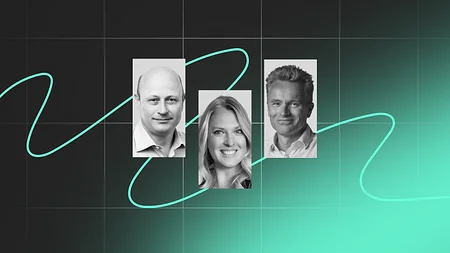Always look on the bright side of Brexit
For Fintech Insider’s news show Jason, Simon and David are joined by 11:FS Research team’s Ross Gallagher, Capco’s Charlie Wood and Fluidly CEO Caroline Plumb, to take on the week’s stories including Brexit, open banking, Robinhood app, and PensionBee’s stand against Aegon.
Listen in full here, stream below or read on for highlights.
Is Brexit an opportunity or a threat?
Kicking off with the big questions, is Brexit more of an opportunity than a threat for fintech? Adam Afriyie The MP who heads Parliament's fintech group says yes."I think we’re poised to continue to take the world by storm on fintech….Brexit, I think, is actually more of an opportunity than a threat," he told BI. In response to fears the UK will fail to attract top international talent after Brexit: Afriyie countered: "People didn’t particularly notice but last November we actually doubled the number of what’s called exceptional talent visas...There’s a big willingness around the world to back Britain, to back British fintech and to continue to invest here” Some of our panel had less than polite things to say in response. However all seem to agree that it probably isn't a bad thing to focus on the potential positives of Brexit, or at least focus on the opportunities it brings, in the words of Caroline Plumb. In the words of Spiderman, or maybe Ross Gallagher "With great struggle comes great opportunities". However David makes the valid point that the government need to work out Brexit before we even know what opportunities are even available to take advantage of. Could Mr Afriyie be jumping the gun with his comments? Tell us what you think here."With great struggle comes great opportunities" - Ross Gallagher
Open Banking Update
It wouldn’t be 2018 without your weekly Open Banking update, this week featuring this story from Moneywise: 73% of Moneywise users won’t use open banking - in a poll of 900 users; 63% said no because they don’t want third parties to access their data; 10% said no because they’re happy with the current comparing and switching processes. It seems to be a common theme that we discuss how no one is going to say yes to Open Banking as a concept unless they're shown really good use cases for it, and currently people won't sign up to something they either don't understand or that has commonly been shown in the media as a bad thing. "Open Banking as a concept is never going to be palatable until someone builds something that improves my daily life" - concurs Ross Gallagher. It is the important distinction between showing people Open Banking at work and just telling them about it. David thinks it's a failing on behalf of the regulators and hte banks not to emphasise the benefits: "Is this not a failing of open banking that they're not educating people on the benefits?" - David Brear. What do you think? Share you thoughts here."Open Banking as a concept is never going to be palatable until someone builds something that improves my daily life" - Ross GallagherIf it's an open banking use case that people are looking for, Credit Ladder have provided one. CreditLadder says it is the first in its sector to launch an Open Banking service that enables tenants to improve their credit score without the need for a lengthy sign-up service or their landlords’ permission. CreditLadder records rent payments being made to a landlord by a tenant and then passes the data to partner credit reference agency Experian, which in turn adds it to the tenant’s credit history. This can help tenants to access more affordable mortgages and other types of credit including cards, loans and mobile phone contracts at more attractive interest rates. Essentially it's a way to grow your credit score without taking out a loan and taking into consideration your ability to meet regular payments, such as a rent payment. £14 million in rental payments have been processed since Credit Ladder started up in 2016 Is this a good example of how Open Banking can be put to use? Caroline says yes, it's good because it's different, it's a use case that thinks outside the box and is a new use case outside that of payments and the standard examples of how open banking can be used, it's a good entry point for future use cases in this market. Agree/disagree? Tell us here.
Atom’s chairman steps down
Atom’s chairman is stepping down just as Atom is about to finalise its £150m funding, and will be succeeded by Bridget Rosewell, one of the company's existing non-executive directors. Is this significant? Will there be big changes from Atom in 2018, and more importantly, where is Will.i.am?? Ross wonders if the company will have to rebrand stating Atom is meant to be named after A. Thom(son) - meaning the new bank could be renamed "Bros" after B. Rosewell, but "Bros" bank is never going to go down well! On a more serious note, is this change of leadership a demarkation of a failure on Atom's part, and in his leaving statement, did Anthony Thomson seemingly diss his own company? Ross thinks they've "gone from the most exciting to falling behind" as other new and more exciting fintechs like Monzo and Starling are seemingly rolling out more popular products and services at a faster rate. Are they just playing a different game?, counters David, they're focusing on lending and profitability - are they playing banks at their own game, rather than trying to compete with the other fintechs? We shall see as Bridget Rosewell takes charge. Share your thoughts on this here."[Atom have] gone from the most exciting to falling behind" - Ross Gallagher
Pension Bee takes a stand
As one fintech chairman steps down, another stands up - defending itself against Aegon. Romi Savova the PensionBee CEO stood up to “corporate bully” Aegon in an open letter, claiming the time it took Aegon to transfer pensions was out of line with other large companies, they've also removed the hassle-free method of doing electronic transfers. Providers such as Aviva, Legal & General and Prudential electronically transfer cash in an average of 12 days, while it takes Aegon an average of 54 days to complete a transfer. Sounds like bullying to us, and we spoke to PensionBee CEO Romi Savova to find out what she had to say... Agree that Aegon are out of line? Tell us here.Seven in 10 UK workers are 'chronically broke'
The RSA studied 2000 UK workers:- 32% of the UK’s workers have less than £500 in savings and 41% have less than £1,000
- 30% of respondents said they lived comfortably,
- 40% said their finances were permanently precarious.
- The remaining 30% said they were not managing to get by.
Meanwhile, in the US...
Millennials with savings of $100,000 or more are on the rise, according to a survey run by BOA into millennials' finances. 16% of millennials now have $100k in saving - double the amount that young people had in 2015.- 63% say they are saving
- 54% have a budget, 73% of whom say they stick to it
- 57% have a savings goal
- 60% say they feel financially secure
"Millennials are actually doing better than you — and they — might think." - Andrew Pleplar, Bank of America’s head of social and governance.
Robinhood - the crypto exchange for millennials?
Following on from the last story, as Robinhood adds zero-fee cryptocurrency trading and tracking, we ask is this where millennials are going to trade crypto? Robinhood said 78% of its 3 million users are 18 to 35-year-olds and 1 in 3 millennials preferred bitcoin to stocks in a Blockchain Capital survey last year. Since this announcement, over 1 million people joined the waiting list for early access. "If there's anything more zeitgeist, I don't know what it could be" - Simon Taylor. The team discuss whether Robinhood is just using the buzz around crypto trading to lure millennials into the app to invest in more traditional stocks and trading, and in this way use crypto as the gateway to investment. "How do you change their attention from something dangerous to something sensible?" - Simon Taylor. Caroline supports this theory by David and Jason don't buy into it, comparing it to supermarkets giving away free cakes in the hope consumers buy broccoli, it's not going to work. What do you think? Share your thoughts with our community."If there's anything more zeitgeist, I don't know what it could be" - Simon Taylor.




